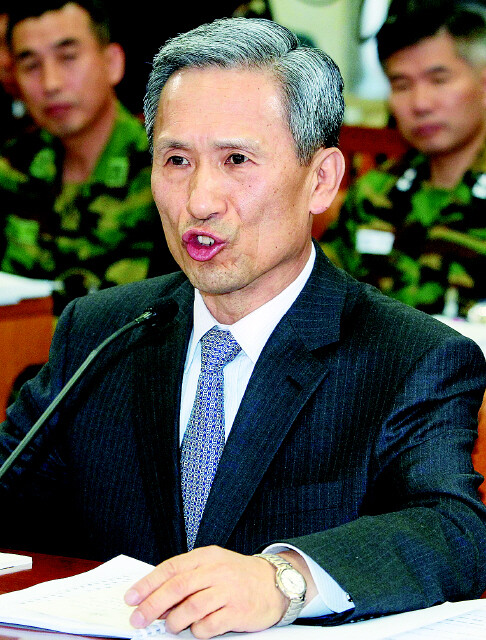hankyoreh
Links to other country sites 다른 나라 사이트 링크
Defense minister-designate voices support for self-defense air raids

By Lee Se-young
At his nomination hearing Friday, Defense Minister-designate Kim Kwan-jin made a distinction between the rules of engagement and the right to self-defense and said that he would “definitely attack” North Korea with aircraft in the event of another provocation from the country.
Speaking at the National Assembly National Defense Committee hearing Friday, Kim said, “The rules of engagement are valid as a guideline in the event of an unintended clash [between North Korea and South Korea], but if we suffer a provocation first, this falls in the scope of self-defense rights, and we can punish an enemy threat sufficiently until the root of it has been completely eliminated.”
The statement is based on Article 51 of the U.N. Charter, which states that a country may use military force in self-defense when it suffers an armed attack by another country.
Experts are divided on where the exercise of self-defense rights through aerial bombing in response to an artillery attack is actually feasible in reality. This disagreement owes to the military characteristics of the Korean Peninsula, where even a small accidental clash can erupt into all-out war, and with the presence of the U.S. Forces Korea (USFK), the actual administrators of the armistice system. Large and small military clashes with North Korea have occurred in the past, but the U.S. has consistently restrained South Korean forces from responding forcefully.
Those who believe a self-defense air raid is possible argue that there is no problem
unless a significant amount of time has passed since the time of the attack or the air raid extends to the rear of the attack area.
“Once a situation breaks out, there is no way for the U.N. Command to initiate measures,” said University of North Korea Studies Professor Ham Taek-young. “You can find a number of cases where South Korean forces have undertaken military operations independently without approval from the U.N. Command.”
The refutations of this argument have been considerable.
“Carrying out an air raid essentially means going from a cease-fire into a stage of war,” said Research Institute for Peace and Reunification of Korea researcher Go Yeong-dae. “It is impossible in a situation where authority for crisis management during the cease-fire lies with the South Korea-U.S. Combined Forces Command.”
Another constraint on the South Korean military’s ability to act independently is the fact that USFK possess the core intelligence assets supporting airborne forces.
Some analysts have interpreted Kim’s argument about responding based on self-defense powers as simply a politically motivated statement.
Please direct questions or comments to [englishhani@hani.co.kr]
Editorial・opinion
![[Column] Is Korean democracy really regressing? [Column] Is Korean democracy really regressing?](https://flexible.img.hani.co.kr/flexible/normal/500/300/imgdb/original/2024/0705/2917201664129137.jpg) [Column] Is Korean democracy really regressing?
[Column] Is Korean democracy really regressing?![[Column] How tragedy pervades weak links in Korean labor [Column] How tragedy pervades weak links in Korean labor](https://flexible.img.hani.co.kr/flexible/normal/500/300/imgdb/original/2024/0703/8717199957128458.jpg) [Column] How tragedy pervades weak links in Korean labor
[Column] How tragedy pervades weak links in Korean labor- [Column] How opposing war became a far-right policy
- [Editorial] Korea needs to adjust diplomatic course in preparation for a Trump comeback
- [Editorial] Silence won’t save Yoon
- [Column] The miscalculations that started the Korean War mustn’t be repeated
- [Correspondent’s column] China-Europe relations tested once more by EV war
- [Correspondent’s column] Who really created the new ‘axis of evil’?
- [Editorial] Exploiting foreign domestic workers won’t solve Korea’s birth rate problem
- [Column] Kim and Putin’s new world order
Most viewed articles
- 110 days of torture: Korean mental patient’s restraints only removed after death
- 2Months after outcry over “torture devices,” Justice Ministry proposes more restraints for immigratio
- 3Beleaguered economy could stymie Japan’s efforts to buoy the yen
- 4[Column] Is Korean democracy really regressing?
- 5Koreans are getting taller, but half of Korean men are now considered obese
- 6[Column] How tragedy pervades weak links in Korean labor
- 7Former bodyguard’s dark tale of marriage to Samsung royalty
- 8Real-life heroes of “A Taxi Driver” pass away without having reunited
- 9[Editorial] Exploiting foreign domestic workers won’t solve Korea’s birth rate problem
- 10Democrats ride wave of 1M signature petition for Yoon to be impeached